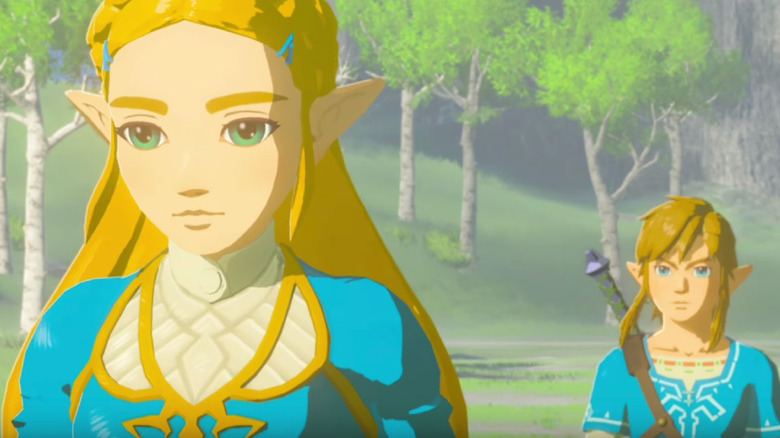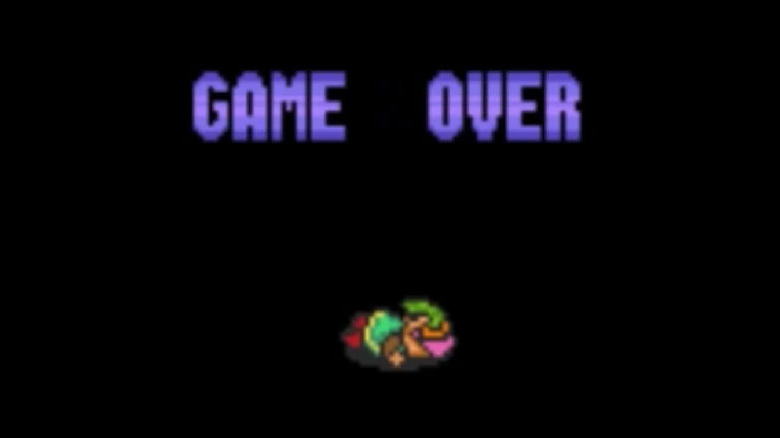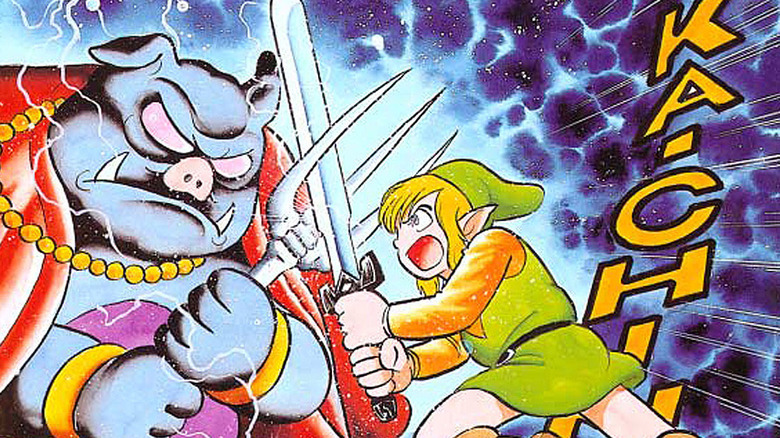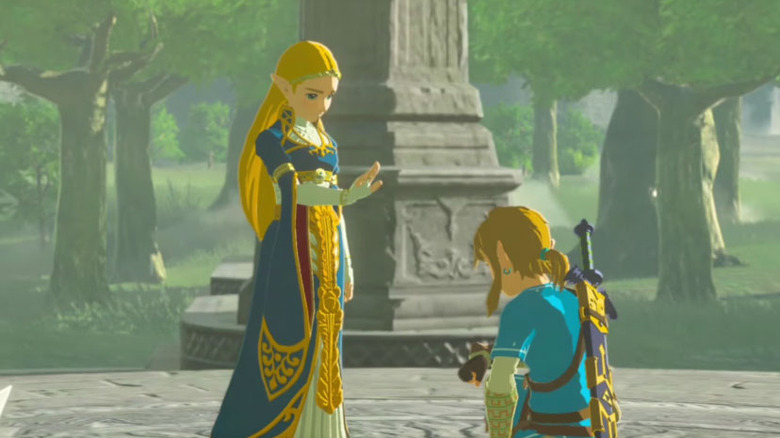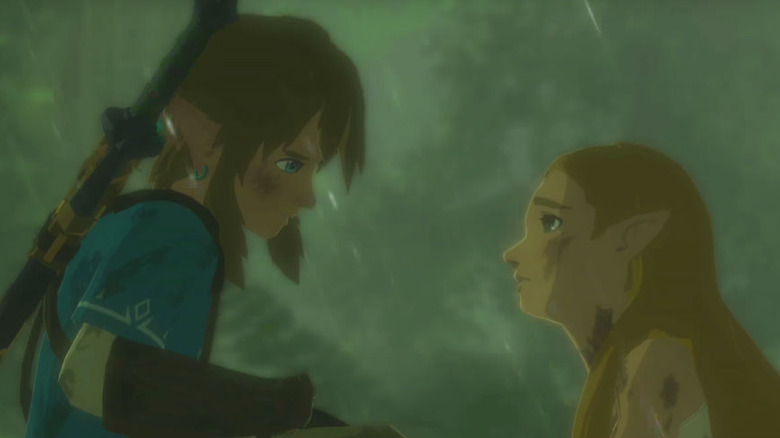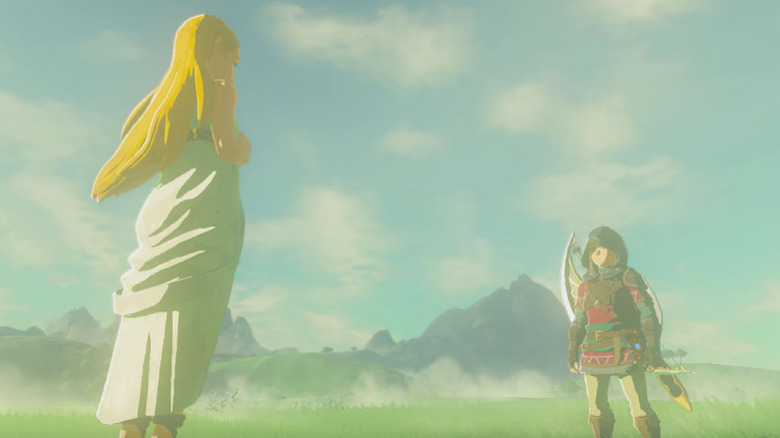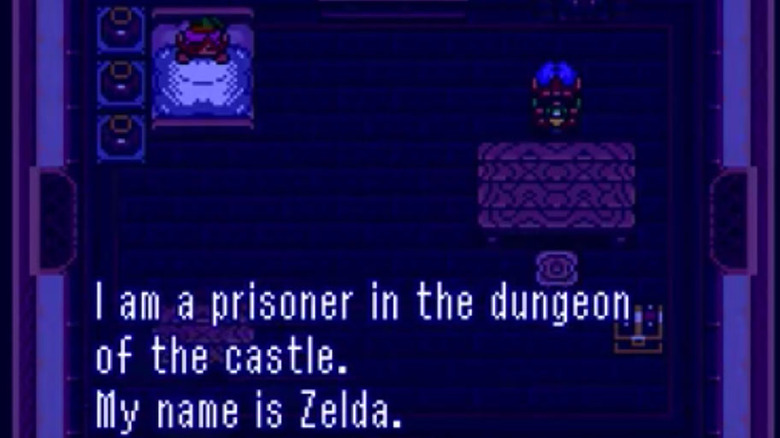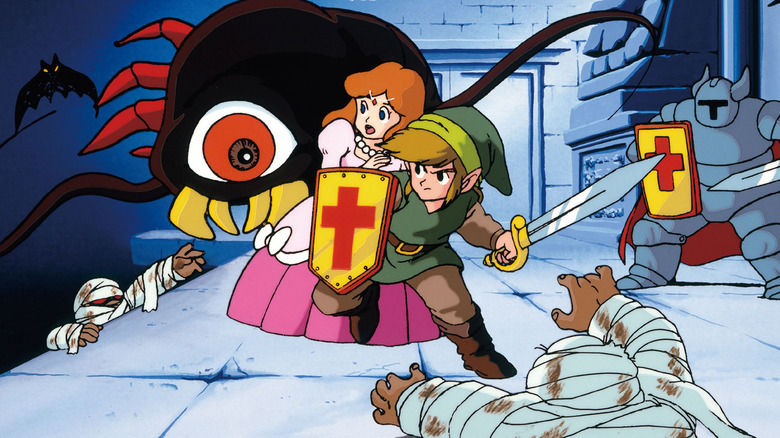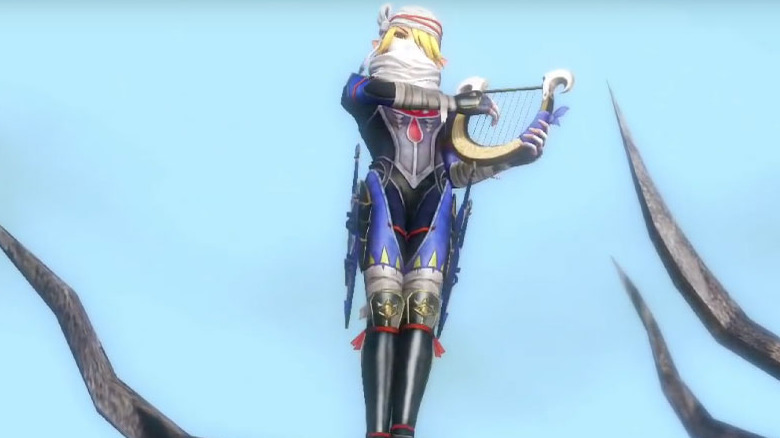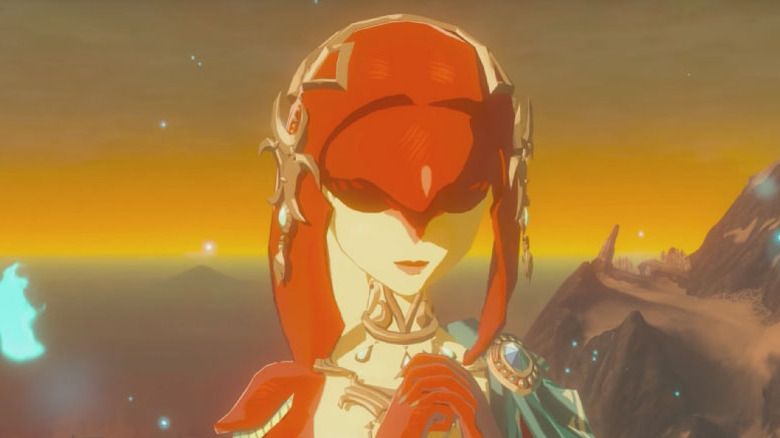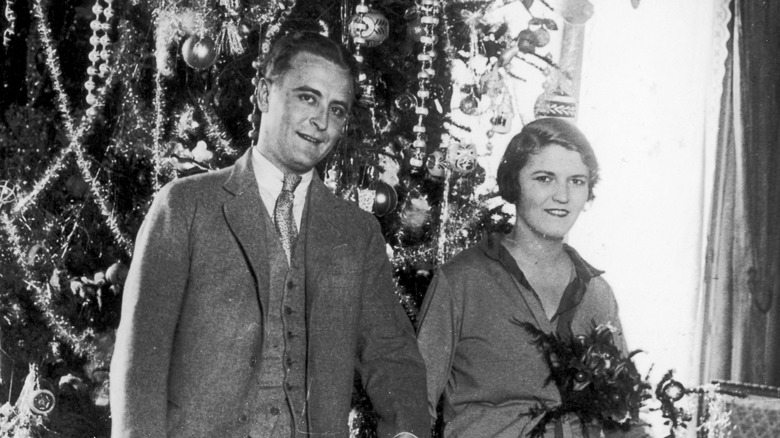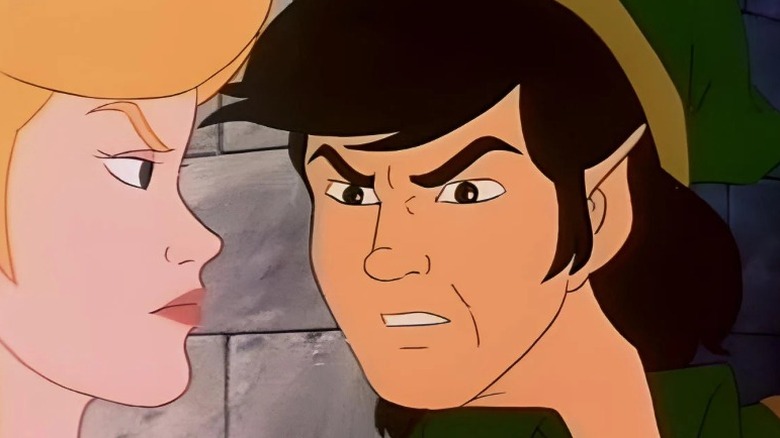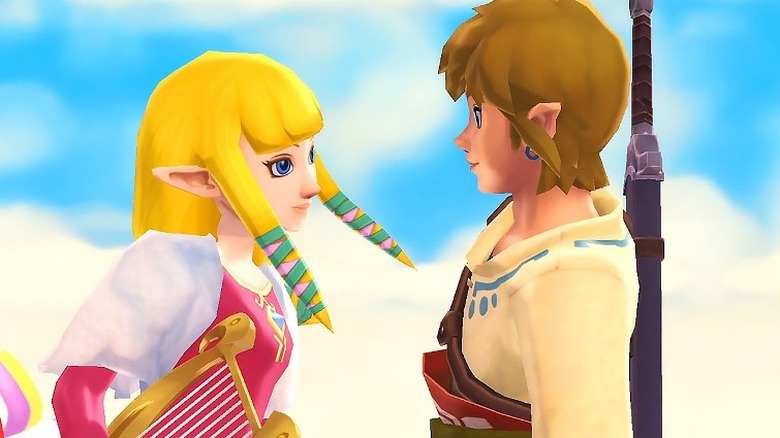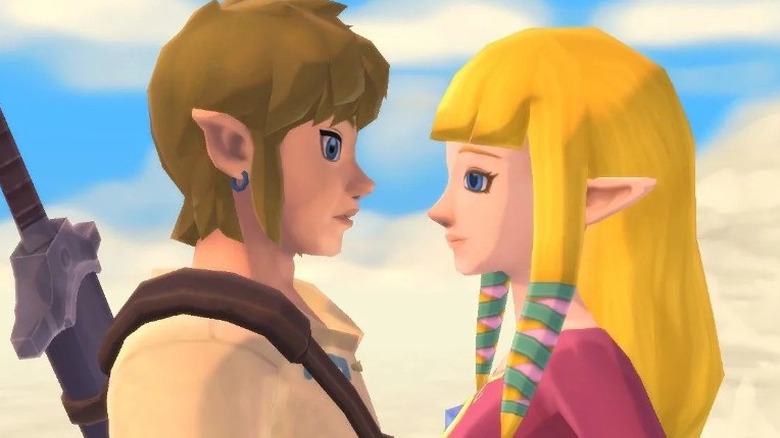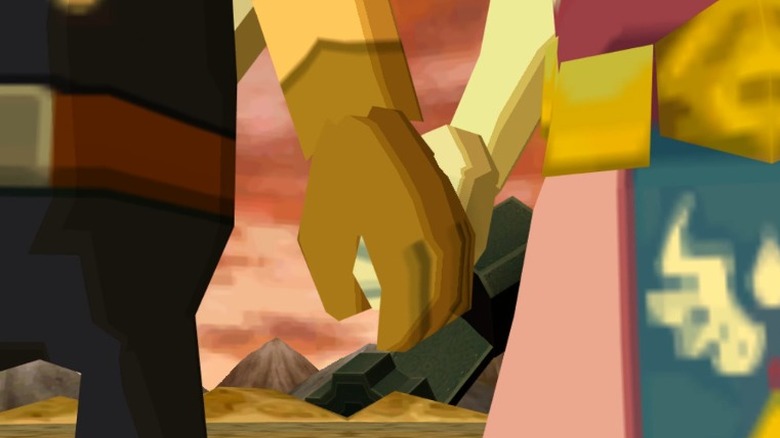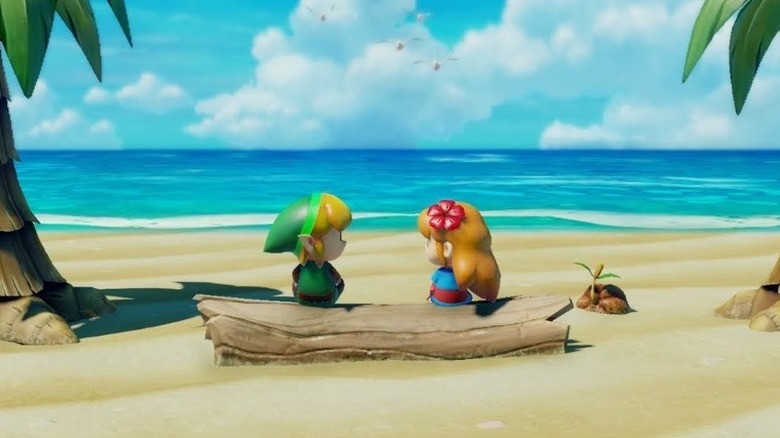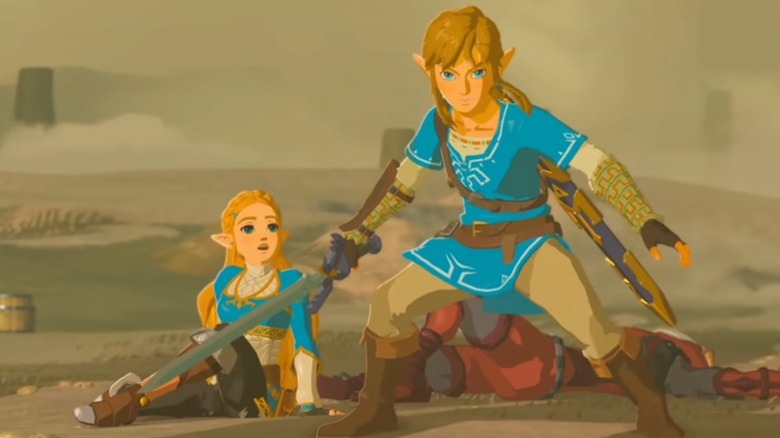Bizarre Things About Zelda And Link's Relationship
Since 1986, Nintendo's "Legend of Zelda" series has defined epic fantasy adventure in video games, with 19 titles spread out over every console the company has made. Through all that time, the relationship between Princess Zelda and her eternal champion, Link, has been at the core of the franchise. The thing is, it's one of the weirdest relationships the medium has ever seen — and for video games, where romance is usually embodied by a plumber saving a princess from a megalomaniacal dragon turtle, that's saying something.
It might look like the standard hero-princess trope, but over its many incarnations, their complicated history has weaved its way through secret identities, a timeline that can only exist because of Link's failures, a disturbing lack of communication, and, perhaps most surprisingly, a really prominent example of ichthyophilia. You might not have noticed them at first but once you start, you'll never stop seeing the truly bizarre things about Link's relationship to Princess Zelda.
Link doesn't have the best track record
In most video games about saving princesses, you actually have to, you know, save the princess. That's when the relationship is fully formed, with the customary smooch and a pixelated heart floating above their heads to signal a happy ending for all concerned. In "The Legend of Zelda" series, on the other hand, saving the princess isn't actually mandatory. In fact, if Link did save Zelda from Ganon every time, we wouldn't have most of these games.
In Hyrule Historia, an oversized art book that chronicles the in-universe history of the "Zelda" games, it's revealed that a fair number of titles in the series, including the original NES "Legend of Zelda," happen in what's called the "Fallen Hero" timeline. This is the timeline that we get when Link fails to stop Ganon at the end of "Ocarina of Time," because that game's idea of alternate universes apparently wasn't complicated enough. That means that for all their connection through the Triforce and the destiny that unites Link and Zelda, half the time their relationship is either doomed to failure or rooted in it.
Ganon: The Ultimate Third Wheel
Of all the weird things about Zelda and Link's relationship, the weirdest of all might be the fact that the forces of destiny have ensured that there's always this other guy just hanging around, which only gets weirder when he occasionally turns into a giant magical pig-man.
As you might've noticed, there's a reason that it's called the Triforce and not the Biforce: they're part of a destined relationship that transcends the very concept of time, ordained by the gods themselves, and unfortunately for them, Ganon's a part of it, too. At the very least, he's going to be tagging along on Link and Zelda's dates with an army of Octoroks and Moblins, so they might as well get used to him being there.
Does this mean they should form a polyamorous triad with Ganon? Well... probably not. He is, after all, a pretty terrible person in most of his incarnations, what with all the kidnapping of princesses, destruction of kingdoms, and a litany of other crimes that include transforming into a ten-story razorback. Still, given that every single game in the entire franchise is built around an unbalance in the Triforce, we imagine that an awful lot bad things could've been avoided if they just invited him over for dinner once in a while.
The real Triforce is nepotism
Forgive us for stating the obvious here, but Princess Zelda is, well, a princess. At the very least, she's a member of the ruling family of an entire kingdom, complete with its own army. Taking all that into consideration, you have to wonder why she keeps putting the fate of the world in the hands of a single sword-wielding tween.
Call it destiny, the Triforce, or the nature of being a hero reincarnated across thousands of years if you want, but we have a word for it when someone gives an incredible amount of power and responsibility to someone who is far less qualified than others just because they have a connection that's not related to their jobs. That's called favoritism, and just because someone can shoot laser beams out of a magic shard of metal, that doesn't make it fair. Throw in the possibility of a romantic relationship, and the Hylian royal family's HR department is going to be working overtime trying to cover up this one.
Opposites attract
As the name implies, the Triforce is a split into three parts: Courage, Wisdom, and the vague and necessarily ominous Power. Ganon has the latter, of course, and Link, whose bravery often leads him to do things like jump off cliffs while holding onto a chicken, is forever bonded to Courage. That leaves Zelda as the mortal incarnation of Wisdom, which makes sense. She's often depicted as the wisest member of the cast by far, whose maturity and stoicism allows her to undergo even the worst that Ganon has to offer with a poise and grace beyond her years.
And then there's Link, who mostly communicates through grunts and screaming, and spends the majority of his time smashing up cookware and running face-first into trees. With his country-boy origins and large collection of swords, he's basically the high-fantasy equivalent of a redneck who lives in the woods and — unless you count swimming under various Octorok-infested waterfalls while fully clothed — has never once been canonically depicted as taking a shower.
And yet, there's no denying that there's a spark between them that goes well beyond friendship or a knight's fealty to his lady. It persists despite the fact that they have even less in common than a blue-collar plumber and a princess who is also somehow a mushroom. We realize that the heart wants what the heart wants, but considering how weird Link is, we're guessing this is a real Anne Bancroft/Mel Brooks "he makes me laugh" situation.
The silent treatment
A good relationship is built on communication. For Link and Zelda, though, that's not really the case.
Just look at "Breath of the Wild," the game that put more of a focus on the development of Zelda and Link's romance than any other entry in the franchise to that point. In the actual canon of that game, Link isn't just quiet, he literally does not speak to Zelda at all for months, even though they're traveling around a massive kingdom together. The only reason they even start talking at all — a development that the players themselves never actually get to see — comes when Zelda makes the effort to open up after Link saves her from being assassinated by the members of an evil ninja clan.
There's nothing wrong with being there for your partner during the hard times, and it's possible that Link's particular love language is less "words of affirmation" (or, you know, words at all) and more "stabbing monsters until they die in order to prove his devotion." That said, if it literally takes attempted murder by ninjas for you to start talking to each other, that's a pretty big red flag for how things are going to go from then on.
Telepathic snooping
Aside from the fact that their shipping name is just "Linda," the weirdest quirk of Link and Zelda's romance is that we very rarely actually see them together. Zelda is almost always the object of an extended series of quests that involve gathering up three of this, seven of that, and enough explosives to level the entire kingdom. As a result, they spend a lot of time apart, which really makes it difficult to develop a relationship.
There is, however, a workaround that we've seen more than a few times throughout the series. In games like "Breath of the Wild" and "A Link to the Past," Link and Zelda share a telepathic connection through the Triforce, which allows them to communicate no matter how far apart they are. The only problem is that from what we can tell, that communication only ever goes one way.
Maybe that's just a result of Link's legendarily taciturn attitude, but it does create an even stranger sort of power imbalance in the relationship than it already had. If Zelda can just pop up in Link's thoughts whenever she wants — and that always tends to happen at appropriately dramatic moments right after he accomplishes a goal — then that means that she's aware of his actions even though he's not aware of hers. That kind of telepathic snooping is definitely not cool without a conversation regarding boundaries, and conversations aren't exactly the strong point for these two.
Post-traumatic romance
While there's always something different in every "Zelda" game, they tend to follow the same pattern: there's always some kingdom-threatening crisis, you always gather up items and weapons that allow you to progress, and you always find yourself stomping through a dungeon of one sort or another. Most importantly, though, is the idea that with the exception of a few games like "The Adventure of Link," one of the franchise's few direct sequels, Link and Zelda almost always start in very different places.
It's only the crisis that drives the game that brings them together, and even in games like "Skyward Sword," where they're childhood friends, it's what provides the groundwork for taking it to the next level and cementing their connection.
Unfortunately, as anyone who's seen "Speed 2: Cruise Control" knows, building a romance around a traumatic situation pretty much dooms it to failure. The adrenaline high that comes with shooting a Silver Arrow into the very heart of evil might provide the spark of intensity, but once that wears off, you're left with a relationship created in a situation that doesn't really exist anymore. Usually, that leads to a breakup, but when your fates are bound together by the will of the goddess Hylia, that's, uh, not really an option. Good luck navigating that one.
Sheik-rets and lies
Maybe Link and Zelda just aren't cut out for a relationship. A romance requires honesty, and if you play through these games, you're going to notice that they keep a whole lot of secrets from each other.
For Link, this is more down to his tendency to remain quiet, although Zelda never asking how his day went is almost as bad as Link himself never telling her about his thing for sea creatures. In Zelda's case, though, it goes a little further. She has multiple secret identities and seems very reluctant to tell Link the truth even when it would help him on his journey.
When she's operating as a pirate queen named Tetra in "Wind Waker," she at least has the excuse of not actually knowing she's Zelda herself, but Sheik in "Ocarina of Time?" Not only is that mysterious identity kept a secret from Link until late in the game, Zelda also holds back plenty of useful information. Considering that she knows he's the Legendary Hero of Hyrule the whole time, giving him songs like the Nocturne of Shadow and Requiem of Spirit the first time they met sure would've made his journey a whole lot easier.
If she can't trust Link, how are they ever supposed to stay in love?
Link's many (and surprisingly fishy) loves
It pretty much goes without saying that Link and Zelda are the focus of these games. He is, after all, the protagonist, and she's the one with her name in the title, so it makes sense that the games would put the spotlight onto their relationship more than anyone else's. The thing is, there's one level where they don't.
Because the separation between Zelda and Link is crucial to the way the games play out, the designers have wound up introducing plenty of other characters for Link to interact with on his quests, and they haven't shied away from potential love interests. It really starts in Ocarina of Time, where Saria and Malon are presented as characters with a potentially romantic connection to Link, in a way that Zelda herself doesn't. Along the same lines, Princess Ruto of the Zora has no "potential" about it — she's in love with Link to the point of being betrothed by the end of his adventure in Zora's domain.
What's really odd is that she's not the only fish-lady to show that kind of interest. "Breath of the Wild" features a similar situation with Princess Mipha, and while that relationship never really gets started, it's because of Mipha's death at the hands of Calamity Ganon, not a lack of interest. Does Link feel the same way about fish-people? Maybe that's why Zelda and Link never seem to have the romantic spark that's on display with other famous video game couples.
A problematic namesake
A lot of the bizarre things about Link and Zelda's relationship can be squarely placed on Link's green-clad shoulders. Really, though, we should've known things were going to go bad for their romance from the start.
As legendary designer Shigeru Miyamoto confirmed, Hyrule's crown princess is named for Zelda Fitzgerald. That's all well and good — it's a beautiful name that's uncommon enough to have that hint of magic and destiny to it — but if our princess is anything like her real-life namesake, her relationships might not have the best ending.
She was, after all, married to "The Great Gatsby" author F. Scott Fitzgerald, and calling their relationship "strained" is sort of like calling the Master Sword a butter knife. They were downright miserable with each other, to the point that Scott publicly referred to Zelda as a "third-rate writer" when her semi-autobiographical novel "Save Me the Waltz" was published in 1932, while they were married to each other.
Of course, there's one level where it's appropriate: like her namesake, Princess Zelda is often overshadowed by her partner, and unfortunately spends a lot of time locked up, which could be a distressingly lighthearted take on the time Zelda Fitzgerald spent in mental institutions, including the one where she would die, locked in an attic when the building caught fire. Here's hoping the "Zelda" games never decide to go quite that dark.
Animated Link is a real 'nice guy'
In almost every iteration of the characters, Link and Zelda rely on each other to get through whatever disaster is plaguing the kingdom — but there's at least one version of their story where Zelda probably wishes she could save the world with anyone else.
Even if you've never watched the 1980s "Legend of Zelda" cartoon, you're probably familiar with its most famous soundbite. Link made a habit of saying, "Well, excuse me, princess" in the most annoying tone possible, to the point where it's become a go-to meme online. Link's exaggerated delivery of the line makes it worth a laugh at least once or twice, but the actual context surrounding his apparent outrage isn't so funny.
Throughout the entire "The Legend of Zelda" show, Link has two real priorities: fighting bad guys and kissing Zelda. Unfortunately for him, the princess just isn't into him, and unfortunately for Zelda, Link refuses to take no for an answer. Whenever Zelda turns Link down, he gets annoyed and comes back later with another request. This cartoon Link really needs to take a page out of the Hero of the Wild's book and stick to being the silent defender type. If he spent more time fighting for Hyrule and less time whining (and acting like Zelda owes him something), he might have better luck with the ladies.
They might be related
In all the years that "Zelda" fans have been adventuring through Hyrule and trying to save the princess, there's arguably only been one game that told a real love story about Link and Zelda. In "Skyward Sword," the two of them are childhood friends with an explicitly romantic connection. When dark forces inevitably kidnap Zelda, Link has more reason than ever to chase after her. Link's journey eventually sees him facing off against Demise, and after Link defeats the Demon King, he and Zelda can finally be together.
The story of "Skyward Sword" holds an important place in the "Legend of Zelda" mythos, but it also comes with some concerning implications for the rest of the franchise. The game takes place before the events of every other "Zelda" game, and it explains how many "Zelda" mainstays, like the Master Sword, came to exist in the first place. At the end of the story, Link and Zelda go on to create the kingdom of Hyrule together.
If Link and Zelda created Hyrule together, then it stands to reason that many of the characters we've met in the rest of the series are their descendants (in this timeline, at least). The royal family in particular has a lineage that goes directly back to the characters from "Skyward Sword," because that's how Zelda maintains her connection to the power of the goddess Hylia. It's entirely possible that some versions of Link and Zelda seen in the other games are actually related.
Gameplay gets in the way of their relationship
Though they haven't always fallen in love, Zelda and Link have met countless times, forming new relationships over many millennia. Whatever kind of relationship the two of them have, it rarely gets to proceed according to plan. Thanks to Ganondorf — the permanent third wheel — and a handful of other villains, Link and Zelda typically find themselves being separated by the unfolding of history.
There's actually another force that keeps the two of them from living peaceful lives together. It's all of us gamers – or, more accurately, what the developers behind the "Legend of Zelda" series think we need. "Skyward Sword" fans were thrilled to finally play a game where Link and Zelda were romantically involved, but the team behind the game didn't set out to tell a great love story.
"As far as the love story goes, it wasn't that we wanted to create a romance between Link and Zelda as much as we wanted the player to feel like this is a person who's very important to me, who I need to find," said "The Legend of Zelda" producer Eija Aonuma in an interview with Game Informer. For better or for worse, gameplay is always the first consideration when Aonuma is working on a new "Zelda" game. If the relationship between Link and Zelda doesn't feed into the actual mechanics of the game, it'll end up on the chopping block.
A spiritual relationship
The connection between Zelda and Link is much deeper between any one relationship between a set of the characters. Zelda's spirit and the spirit of Hyrule's hero are destined to keep reincarnating and encountering each other throughout the kingdom's history. On the surface, the two of them are completely different people every time they return, but their souls are the same.
But there's one "Zelda" game where the two have a completely different kind of spiritual connection. The Nintendo DS game "Spirit Tracks" arguably gives us the most closely connected Zelda and Link in the series to date. Though they aren't necessarily in love, these versions of the characters rely on each other more heavily than any other. They spend the entire game working together, and Zelda is such an integral part of the adventure that she's a playable character for the first time in the franchise's history — kind of.
The catch is that Zelda has to be separated from her physical body and left in spirit form for any of this to work out. Early in the game, Zelda's body gets possessed by the evil Malladus, and she needs Link's help to get it back. Along the way, the two uncover the mystery of the vanishing Spirit Tracks that convey trains all across New Hyrule. The game's ending also teases that the two of them might have fallen in love during their journey, making one of their most romantic stories the one in which Zelda is a disembodied spirit.
Literally the girl of Link's dreams
You'd think that including Zelda in a "Legend of Zelda" game would be mandatory, but there's one game in the series where the titular princess doesn't make an official appearance. In "Link's Awakening," the Hero of Legend from "A Link to the Past" leaves Hyrule to find new ways to broaden his skills and experience. While journeying across the seas, Link gets shipwrecked on the mysterious Koholint Island.
A young woman named Marin discovers Link washed up on the shore of the island. She rushes to his side, and when Link first hears her voice, he believes that she's Zelda. After that initial confusion, the two get to know each other. They even form a deep bond that borders on the romantic, but they don't get the opportunity to have a real relationship with each other.
That's because the entirety of Koholint Island and all of its inhabitants are part of Link's subconscious mind, a dream world created by the Wind Fish. Many of the creatures in the game, including the nightmarish version of Ganon that serves as the final boss, come from Link's memories. Marin herself is seemingly Link's inner vision of Princess Zelda. That's right; she's literally the girl of Link's dreams.
Unfortunately for Link, going home means waking the Wind Fish and ending the dream, but a secret post-credits moment unlocked by beating the remake with no deaths hints that Marin may have escaped by being transformed into a seagull.
Taking things real slow
"The Legend of Zelda: Tears of the Kingdom" is the largest game in the franchise by far, not to mention one of the few direct sequels that the "Zelda" series has ever seen. That gives the game a rare opportunity to elaborate on a previously established relationship between Zelda and Link — and it's done so in some pretty interesting ways.
"Tears of the Kingdom" separates Link and Zelda from one another, but it also drops some tantalizing hints about how their relationship developed after the end of "Breath of the Wild." In the sequel, if Link revisits his house in Hateno village, he'll find notebooks from Zelda that reveal she was living there for quite some time and even had a secret room installed beneath his well. Did Link and Zelda finally move in with each other after a few millenia?
Zelda voice actress Patricia Summersett certainly seems to think there's room for interpretation when it comes to the pair's bond. "I know that [Link and Zelda] are in a relationship with each other, it's active, there's a lot of care and a lot of listening," she told TheGamer. She didn't go as far as saying the two were definitely romantically involved, but fans were quick to read between the lines and make assumptions. Summersett later took to Twitter to emphasize that she didn't mean to imply Link and Zelda are romantically involved, but that their relationship is nonetheless deep and inspiring.
Hey friends,
I appreciate the passionate discourse on the subject, but must clarify: pic.twitter.com/02dLg34z2t
— Patricia Summersett (@Summersett_) May 22, 2023

